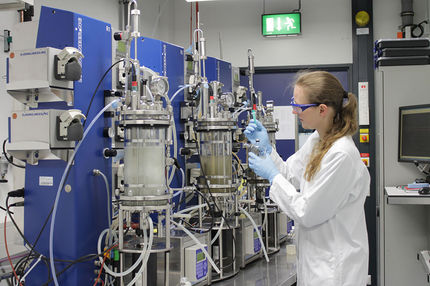Achieving better and cheaper biodiesel
Is there any connection between wine and biodiesel? The answer is yes, however surprising it may seem. Acetals are chemical compounds found in many wines, like port, for example, which give it a unique, sweet smell. However if acetals are blended with biodiesel, they improve its properties. The SUPREN research group of the Department of Chemical Engineering and the Environment of the Faculty of Engineering in Bilbao (UPV/EHU) is working on a project that is seeking to encourage the use of this rare fuel. The idea is to produce acetals more easily and more cheaply. The starting point is the alcohol obtained from sugar-rich plants, or glycerol, a bi-product of biodiesel which is also a kind of alcohol. The aim is to come up with an industrial process to obtain the supplements that will improve the biodiesel we will eventually be putting into our vehicles.
If we compare petroleum-based diesel fuel with that based on plants, biodiesel has better properties in terms of oily texture and biodegradation; yet it is worse from the point of view of oxidation, energy potential and contamination. SUPREN, the Sustainable Process Engineering Group of the Department of Chemical Engineering and the Environment of the Faculty of Engineering in Bilbao (UPV/EHU), is studying the supplements that could overcome these drawbacks. They have delved into acetal production in particular.
From the point of view of chemistry, acetals are obtained through the reaction of an alcohol and an aldehyde. They are generated naturally in fermentation processes. For example, in many wines like port, acetals are the indicators of quality because of the tremendously special, sweet smell they give the wine. When the liquid is poured from glasses into the fuel tank, the acetals improve the properties of the biodiesel when they mix with it: combustion is more effective and, what is more, it is less polluting because engine performance is increased. It is vitally important to come up with a method to obtain acetals easily and cheaply, as a litre of biodiesel may have an acetal content of about 15%.
From the lab to industry
It is easy to produce acetals in a laboratory, but designing an industrial-scale process is quite another matter, according to the UPV/EHU researcher Ion Agirre. He is trying to make this process possible with the help of his colleagues in the SUPREN group. He has experimented with the alcohol that is the by-product of sugar-rich plants (sugar cane, beetroot, etc.) and also with glycerol, both of which are alcohols of renewable origin. Glycerol is also an alcohol and is a by-product obtained from the reaction to produce the biodiesel. It is used, above all, in cosmetic creams and other products, but it is difficult to channel all the glycerol generated in biodiesel production to this use. That is why it would be advantageous to validate this compound in acetal production.
One of the conclusions of the research has been that glycerol-based acetals transmit better properties to the biodiesel in comparison with the alcohols from sugar-rich plants like, for example, ethanol or butanol. Research has also been done to see what would be the most suitable process for producing acetals from the point of view of output. And the conversion level of the reaction would in fact range between 50% and 60%, in other words, only that quantity of alcohol would be turned into acetal. To make the process industrially valid, the aim would be to reach 100% output or conversion, and the latest experiments have shown that this is possible. Using a resin as a solid catalyst instead of sulphuric acid, and glycerol and butyraldehyde or acetaldehyde as the starting point, they have obtained outputs of 100%.
They have used laboratory techniques to achieve these results, techniques that have been little developed industrially; but the production of acetals from glycerol using conventional techniques would appear to be feasible. This research has made it possible to gain in-depth knowledge about the reactions for obtaining acetals, thus making it possible to design an industrial process and making an advance calculation of the details of the costs which acetal production would involve.
Original publication
Güemez MB, Requies J, Agirre I, Arias PL, Barrio VL, Cambra JF. Acetalization reaction between glycerol and n-butyraldehyde using an acidic ion exchange resin. Kinetic modelling. Chem. Eng. J 228 (2013) 300-307
Most read news
Original publication
Güemez MB, Requies J, Agirre I, Arias PL, Barrio VL, Cambra JF. Acetalization reaction between glycerol and n-butyraldehyde using an acidic ion exchange resin. Kinetic modelling. Chem. Eng. J 228 (2013) 300-307
Topics
Organizations
Other news from the department science

Get the chemical industry in your inbox
By submitting this form you agree that LUMITOS AG will send you the newsletter(s) selected above by email. Your data will not be passed on to third parties. Your data will be stored and processed in accordance with our data protection regulations. LUMITOS may contact you by email for the purpose of advertising or market and opinion surveys. You can revoke your consent at any time without giving reasons to LUMITOS AG, Ernst-Augustin-Str. 2, 12489 Berlin, Germany or by e-mail at revoke@lumitos.com with effect for the future. In addition, each email contains a link to unsubscribe from the corresponding newsletter.




























































